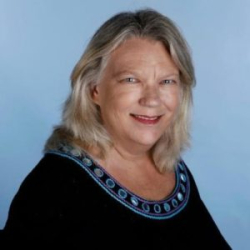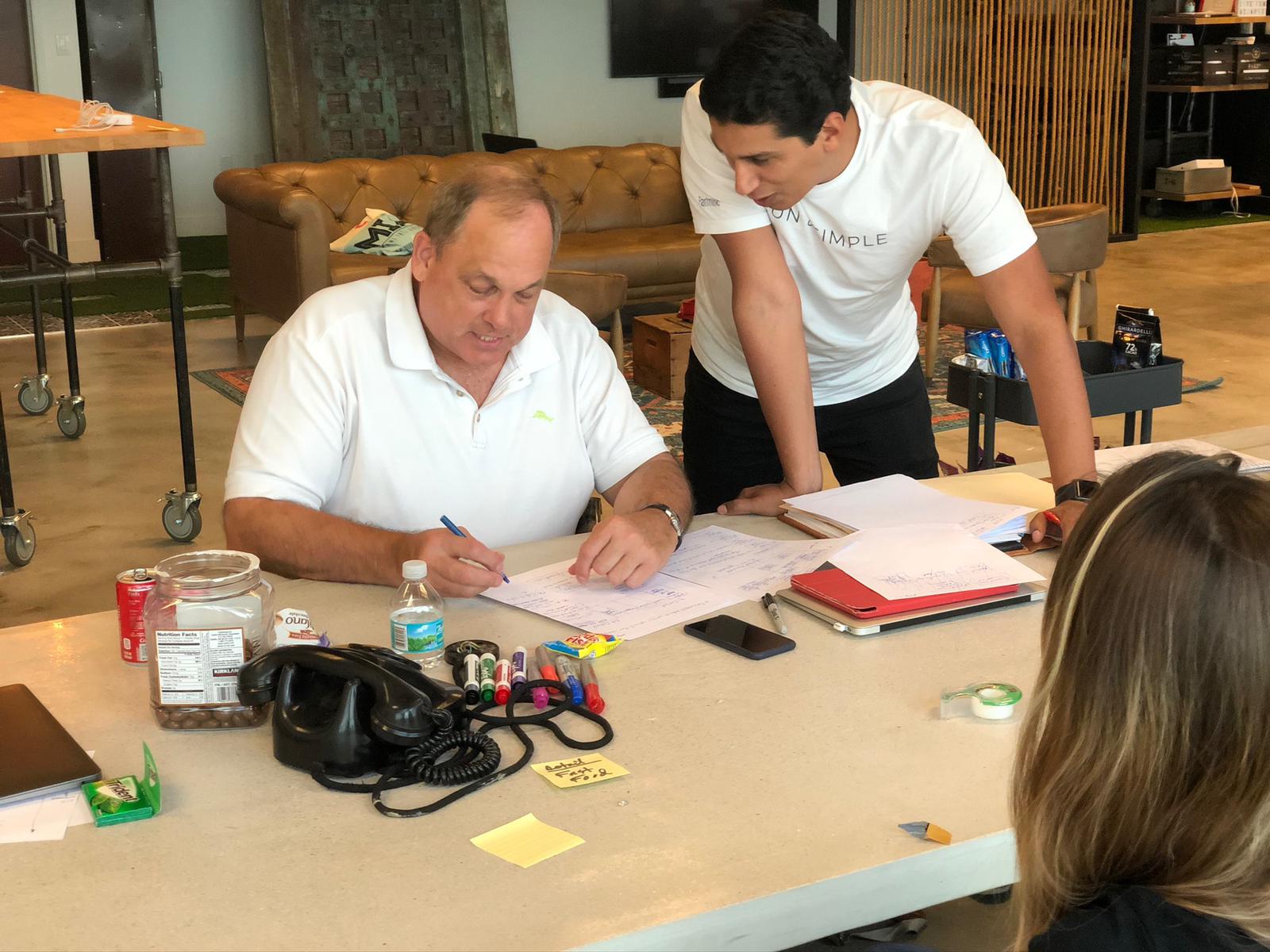By Nancy Dahlberg
What makes a great mentor?
At 500 Startups Miami’s recent Demo Day, I was sitting behind the “Best Mentor,” at least according to 500 Startups’ sign on the back of the reserved chair. I was intrigued and wanted to learn more about Richard MacDonald.
Mentorship, so many experts say, is a critical ingredient of a healthy startup community. So what does a successful mentoring relationship look like? After talking with MacDonatd and one of the startups he mentors, I learned it goes far beyond a few meetings at a co-working space or during “office hours.” Those sessions may help, but a true relationship has to go deeper – by both sides.
A great mentor has a lot to offer.
 Richard MacDonald is able to help startups with their go-to-market strategies because he worked in that world for 30 years. He was one of four people who started the original PwC Consulting organization and in 10 years helped grow it to its sale to IBM. His experience also comes from years of working with a number of companies, including Cisco, Novell, Verizon and Disney, in a leadership or consulting capacity and managing large teams while based around the world. He also has advised startups in the Boston area, his hometown. All that experience went into a growth methodology MacDonald developed.
Richard MacDonald is able to help startups with their go-to-market strategies because he worked in that world for 30 years. He was one of four people who started the original PwC Consulting organization and in 10 years helped grow it to its sale to IBM. His experience also comes from years of working with a number of companies, including Cisco, Novell, Verizon and Disney, in a leadership or consulting capacity and managing large teams while based around the world. He also has advised startups in the Boston area, his hometown. All that experience went into a growth methodology MacDonald developed.
He moved to South Florida from Boston about four years ago and started mentoring startups in University of Miami’s Launch Pad Program as a mentor and Entrepreneur In Residence. About a year ago, he joined 500 Startups Miami as a mentor and instructor and recently joined Endeavor Miami‘s mentor network. In the Miami area, he has worked with about 20 startups and heavily worked with about 8.
A great mentee is ready to put in the time to understand and execute.
 Brothers Jorge and Eddy Prado, co-founders of Fastmind, an marketing-tech startup based in Plantation, happened to be sitting next to MacDonald on the first day of the 500 Startups Miami Growth Accelerator and they kicked off a conversation. Fastmind was one of the companies selected to participate in the accelerator, and throughout the program they worked with MacDonald, as well as with other 500 Startups mentors. But since the program ended three months ago, the Fastmind co-founders still meet 4 to 5 hours a week with MacDonald.
Brothers Jorge and Eddy Prado, co-founders of Fastmind, an marketing-tech startup based in Plantation, happened to be sitting next to MacDonald on the first day of the 500 Startups Miami Growth Accelerator and they kicked off a conversation. Fastmind was one of the companies selected to participate in the accelerator, and throughout the program they worked with MacDonald, as well as with other 500 Startups mentors. But since the program ended three months ago, the Fastmind co-founders still meet 4 to 5 hours a week with MacDonald.
“We have been focusing on launching the product, we proved product market fit and in 2020 we will be in full growth mode. Participating with Richard and the 500 startups team, it was the perfect time to create what this guy calls the growth machine — to take the product that one, two of three clients love to many. We are redefining the way we sell to the client, because that is one of the things we learned,” said Jorge Prado, CEO, who moved with his brother to the Miami area about seven years ago from Venezuela. “Today Fastmind is selling to large enterprises to increase their conversion rate up to three times by creating highly optimized landing cards, what we call Fast Cards. They have a clear call to action for the users.”
During the course of the 8-week accelerator, MacDonald explained, he and the Fastmind co-founders reviewed the critical elements of what enables a company to accelerate its growth, from making sure the product is fit correctly, the customers are selected correctly, the marketing and operations are right, and the way in which you measure growth is correct. “All of these things fit together and you need to line them all up so you create a growth platform to enable yourself to grow to the maximum level that your company can,” MacDonald said.

“Fastmind has been able to identify their targets – customers and markets – produce the go-to-market material and approach their target customers in an efficient and effective way. We are right now at a level where we can kick that up [by leveraging automation technologies],” MacDonald said. “So instead of reaching out and touching one customer, you can now reach out and touch a thousand.”
It’s about the process, not just the outcome.
There’s a good reason for the four- to five-hour weekly meetings.
Listen to MacDonald here. “My philosophy is it is not a quick 30 or 45 minutes. You don’t know what you don’t know. As you start the conversation, it is more beneficial to allow that time to explore and answer questions and help and I think it is more valuable for the company and certainly more rewarding for me because I measure my success by how much they are benefiting from some of the experiences that I have had in my career.”
And listen to the Fastmind brothers. “Most mentors analyze some aspect of your company based on their experience and they give you some advice. They might check back to see how you did,” Jorge said. “Richard becomes a part of the team.”
That means he spends the time to truly understand the challenges and then helps the team figure out not only what they need to do but how they are going to get there. “Otherwise sometimes we can get high value advice but we don’t know how to execute it,” said Jorge.
Adds Eddy, Fastmind’s CPO: “Those 4 to 5 hours have been ultra-productive, they feels like 20 hours a week. … Richard understands what it is to be an entrepreneur and has been helping us learn how to achieve more and faster with our minimal resources.” (Richard and Eddy pictured at top).
For great mentors, mentoring isn’t an obligation – they really want to help.
“It is satisfying to give back,” said MacDonald. “You went through experiences, you lived the pain and you learned things, and when you pass things along, it feels good — especially when they listen and execute and see the benefits.”
To that end, MacDonald has been compiling a practical, easy-to digest startup guide.
While working with UM startups, MacDonald took note of common questions and began collecting the best guidance on each topic, whether it’s from Y-Combinator or 500 Startups, Stanford or Wharton or his own experiences. He compiled one-pagers, citing the sources, on market entry, customer evaluation, target customers, financing, growth, etc. As he has been showing it to fellow mentors, they have volunteered materials, too. It is now up to about 60 pages – and growing.
“With some people who want to give back, there is a hidden agenda. Richard has shown that his passion for helping is pure and I suggest to other entrepreneurs that there are people out there that can help you. It can be the difference between making it and not making it at the end,” said Jorge, “I would like to publicly in the name of the company thank him for his help, and also all the other advisers who have helped Fastmind.”
Jorge and Eddy also encouraged other entrepreneurs to seek out accelerators and programs where they are able to share experiences with other founders. Fastmind also went through TheVentureCity’s accelerator and last year it was selected to join the Endeavor network.
Because MacDonald hails from Boston and has worked all over the world, I took the opportunity to ask him about his thoughts on the Miami area and the Sunshine State.
“I think of all the places in the country and I think Florida holds probably some of the highest potential to spin out new companies and new industries because of the basic infrastructure, programs and education base that is here,” MacDonald said. With private sector support such as programs like 500 and the Knight Foundation, as well as state and local government support, MacDonald called it “a magical time, like the early stages of Silicon Valley.”
Trends rising up? MacDonald sees lots of potential in applications and also advanced manufacturing. In the Orlando area, particularly, he already sees signs of a high tech manufacturing cluster in formation, “We are in the early stages of it, in my opinion.”
And on the startups themselves?
“I had a certain expectation of what the startups would be like in Florida. In almost every case they have exceeded my expectations with the quality, the thoughtfulness, the intellect and the culture they are building. I’ve been really pleasantly surprised and it has increased my excitement about working with everyone here.”
Have you had a good mentoring experience you would like to talk about? Reach out.
Follow @ndahlberg on Twitter and email her at [email protected]/
- Tech and politics do mix at 2024 Miami Tech Summit, with eye on the future - April 18, 2024
- #MiamiTech Everything: Seen and heard in April - April 17, 2024
- 8+ things to know in #MiamiTech: Dapta and Siprocal raise funding, plus news from Jeff Bezos, MoonPay, Sustainable Skylines, Freebee & more - April 11, 2024





